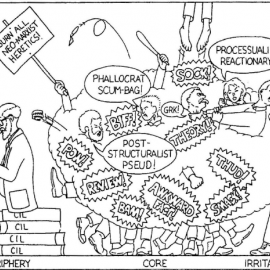Many IPinCH team members are involved in teaching at the university-level. Click the links below to view a selection of course syllabi related to IPinCH themes.
Dr. Sonya Atalay — "Indigenous Archaeologies"
Spring 2013, UMass Amherst
How do Indigenous people around the world engage with archaeology? How do they study and protect their sacred sites and landscapes? What research methodologies and ethical frameworks can we follow when conducting research on Indigenous peoples’ cultural heritage? Indigenous communities are involved in archaeology and cultural heritage tourism and management projects of all sorts. For example, The Maoriori people in New Zealand are using state of the art technology to scan sacred carvings located on spirit trees. The Kashaya Pomo have developed cultural protocols for conducting fieldwork using their traditional teachings. Aboriginal people in Australia are now the primary tour guides for a rock art site that is several thousand years old. Closer to home, for the Anishinaabek in Michigan, nearby rock art images are viewed as a “teacher”. Tribal members provide regular cedar baths to nourish the stone that holds over 100 cultural instructions for how to live in balance with creation. In this course, we will explore these and many other examples of indigenous archaeology. Some are very close to home – being conducted by UMass faculty, others from around the globe. These projects set new directions for archaeology in an area of study called “Indigenous Archaeology”.
Dr. George Nicholas — "Archaeological Theory"
Spring 2013, Simon Fraser University
“It’s not what you find, it’s what you find out.”
This oft-cited statement by David Hurst Thomas characterizes much about what differentiates contemporary Americanist archaeology from its predecessors. And what we find out about the past is dependent upon the questions asked. What those questions consist of, in turn, is based upon how we think about the past—or, in other words, upon archaeological theory. This tip-of-the-iceberg course reviews the history of archaeological theory, from its earliest manifestations through to what’s going on in the current issues of American Antiquity and Journal of Social Archaeology. In doing so, we will examine each of the major schools of thought, including culture history, processualism, and various flavors of post-processualism. In addition, we will also look not only at the historical context and sociopolitics relating to the development of these different approaches, but at how archaeology has influenced contemporary society and also who benefits from archaeological research. A basic understanding of archaeological theory will thus provide you with a greater understanding of the dynamic nature of archaeological thought, an appreciation of how and why archaeological thought has developed, and the means to evaluate different ways of looking at the past.
More course syllabi can be found on the Commodifications of Cultural Heritage - Themed Syllabi page.






